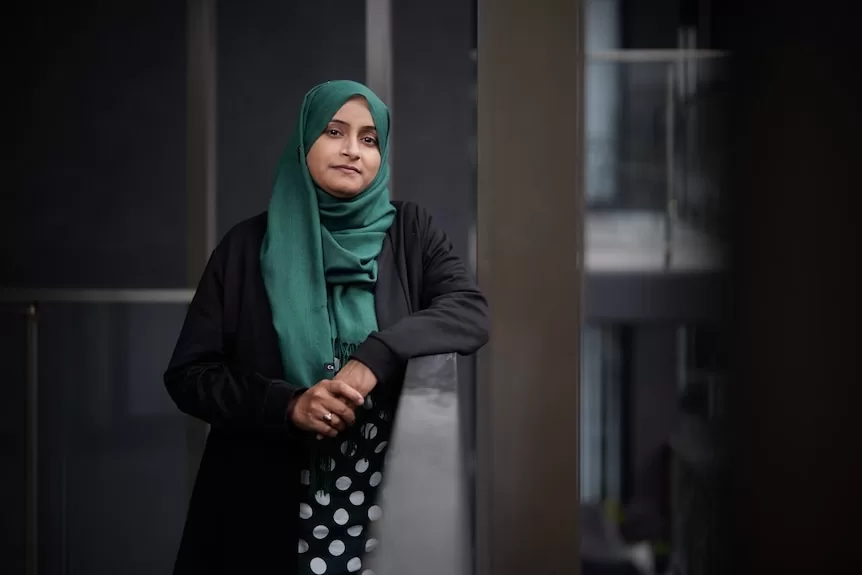Forbidden from working, mother of two Raffat Fatima had no money or family to help come up with a plan to keep her children safe.
Instead, she turned to legal aid, and a caseworker soon became her guardian angel.
“We had nowhere to go so we ended up staying in her house for a month,” she said.
“I could never pay her enough for all of this, such a big help”.
After she immigrated from Pakistan with her husband, she says he stopped her working as a mechanical engineer, and tightly controlled her movements.
Then she says the violence started.
School teachers tried to intervene, but Ms Fatima felt trapped, and pretended all was fine, for the sake of their children.
Ms Fatima said her husband also used legal and financial means to control her, which resulted in her Centrelink payments being cancelled and the government pursuing her for welfare debts.
She then found out her husband had sold their first home without telling her, so these profits were not reported to Centrelink.
Through her caseworker, she was put in touch with several other services including the Welfare Rights Centre, who helped get her Centrelink payments reinstated and the debts cleared.
She now lives in a new home in Western Sydney, and is back working as a mechanical engineer.
Funding shortfall
The Welfare Rights Centre was provided emergency state and federal government funding during the pandemic, the Black Summer bushfires and other major events.
These crisis payments are winding up, and will cease by 2026.
While the centre also receives funding from philanthropic grants, CEO Katherine Boyle fears the organisation’s level of staffing could be slashed by about 40 per cent if forced to solely rely on core funding already earmarked.
Core funding from both the state and Commonwealth is just over $750,000 a year, which equates to about five staff members, but with additional payments the organisation has been working with the equivalent of about 11 full-time positions.
Both the federal and New South Wales governments have not said whether there will be more money for the centre in upcoming budgets.
Ms Boyle said the not-for-profit was already struggling to meet demand.
“People are literally crying on the phone to us for help,” Ms Boyle said.
The additional funding allowed the organisation to create a First Nations access program, and hire a Wiradjuri woman who has been critical in establishing those relationships in Indigenous communities.
“We have enough to keep that worker and program going for about another six weeks,” she said.
The community legal practice was praised during the Robodebt royal commission, with Government Services Minister Bill Shorten singling out Ms Boyle and other “welfare advocates” who “tirelessly and continuously warned about robodebt on behalf of our most vulnerable”.
“These people are underfunded,” he told parliament in February 2023.
University of Newcastle welfare researcher Associate Professor Wendy Foote said these types of centres are critical for those struggling to navigate the system, because they work with other services to provide holistic care.
A recent study Dr Foote was involved in with Newcastle refuge Jenny’s Place found the timing of assistance can be vital in helping women escape violence.
Ms Boyle says she often sees abusive men weaponise Centrelink against their partners to cut-off payments and financially cripple and control them further.
“And it works, they stop the payments and then ask the questions. That’s when we come in.”
Dr Foote’s study found women had attempted to leave abusive relationships up to nine times before it was successful, an increase compared with a few years ago.
“It’s a journey for women to figure out that they are being victimised in a domestic violence relationship and it occurs over time,” she said.
Without adequate support services, she said for many it becomes a choice between a dangerous home or homelessness.
Thousands turned away
Welfare Rights Centre is not the only community legal centre saying they are stretched and need more funding certainty.
The Community Legal Centre Australia chief executive Tim Leach said the 165 centres he manages recently reported servicing about 180,000 people a year, but had turned away more than 360,000 people.
“These are people who are experiencing serious financial hardship, it’s not like they can go out and purchase that legal assistance,” he said.
“Our concern is if they’re not getting it from us, they’re not getting it from anyone and that leaves them very, very vulnerable in the legal system which is very hard to navigate.”
He said nobody really tracks what happens to them once they slip through the cracks, but has seen people turn to crime, get stuck in violent relationships and face eviction.
The former Coalition government set up a National Legal Assistance Partnership to provide funding to legal assistance services via states and territories over five years until June 2025.
A spokesperson for federal Attorney-General Mark Dreyfus said an independent review was underway to consider how future arrangements could better provide access to justice for all.
“The Albanese government recognises the pressures these services are under, and the importance of strengthening the legal assistance sector,” they said.
“Legal assistance is essential to ensuring access to justice and equality before the law.”
Mr Leach said the five-year plan was inadequate to begin with, and made significantly worse by the fact indexation was paid at 1.5 per cent per year, while inflation ballooned to nearly 8 per cent.
A spokesperson for Attorney-General Michael Daley said he recognised the value community legal centres (CLC) have and the vital role they play for disadvantaged people who need legal advice.
“The NSW government will continue to engage with the peak body, CLCNSW, including to understand the challenges and workload pressures being experienced by the CLC sector.”
Posted , updated
